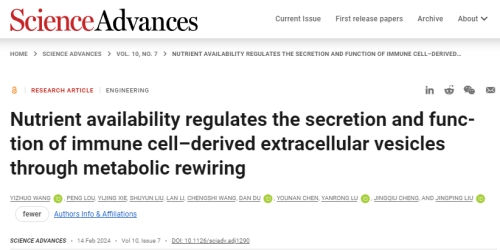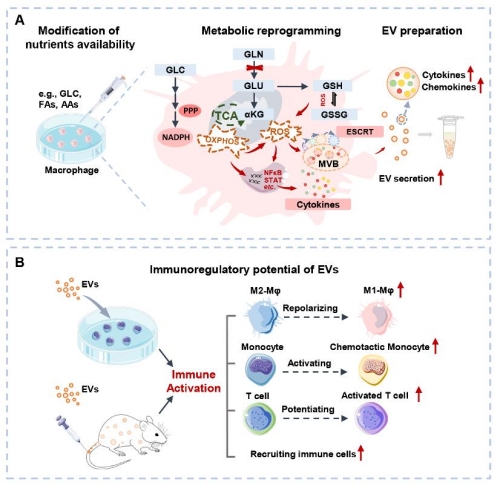The research team of Jingping Liu of the Department of General Surgery and NHC Key Laboratory of Transplant Engineering and Immunology, SCU published in Science Advances a research paper titled "Nutrient Availability Regulates the Secretion and Function of Immune Cell–derived Extracellular Vesicles Through Metabolic Rewiring" (doi: 10.1126/sciadv.adj1290.) in February. This study reports for the first time a new strategy to increase the secretion and biological activity of extracellular vesicles (EVs) by regulating cellular nutrient metabolism. It reveals that the metabolic state of donor cells should be optimized during the secretion of therapeutic EVs, thereby efficiently producing EVs with high function and enhancing their disease therapeutic potential.

“Extracellular vesicle (EV)–based immunotherapeutics have emerged as promising strategy for treating diseases, and thus, a better understanding of the factors that regulate EV secretion and function can provide insights into developing advanced therapies. Here, we report that nutrient availability, even changes in individual nutrient components, may affect EV biogenesis and composition of immune cells [e.g., macrophages (Mφs)]. As a proof of concept, EVs from M1-Mφ under glutamine-depleted conditions (EVGLN−) had higher yields, functional compositions, and immunostimulatory potential than EVs from conventional GLN-present medium (EVGLN+). Mechanistically, the systemic metabolic rewiring (e.g., altered energy and redox metabolism) induced by GLN depletion resulted in up-regulated pathways related to EV biogenesis/cargo sorting (e.g., ESCRT) and immunostimulatory molecule production (e.g., NF-κB and STAT) in Mφs. This study highlights the importance of nutrient status in EV secretion and function, and optimizing metabolic states and/or integrating them with other engineering methods may advance the development of EV therapeutics.” (Abstract)

This study suggests that changing the availability of a single nutrient component in culture conditions is sufficient to induce systemic metabolic reprogramming in cells and activate pathways related to EV production and functional molecule synthesis, thereby achieving efficient production of therapeutic EVs with specific immune activity.
The corresponding author of this paper is Jingping Liu, a research fellow of the NHCKey Laboratory of Transplant Engineering and Immunology, and the first author is Yizuo Wang, a doctoral student.SCU’s West China Hospital is the work unit of the corresponding author and first author. The research work was funded by projects such as the National Natural Science Foundation of China and the West China Hospital's 1·3·5 Program.
https://www.science.org/doi/10.1126/sciadv.adj1290
